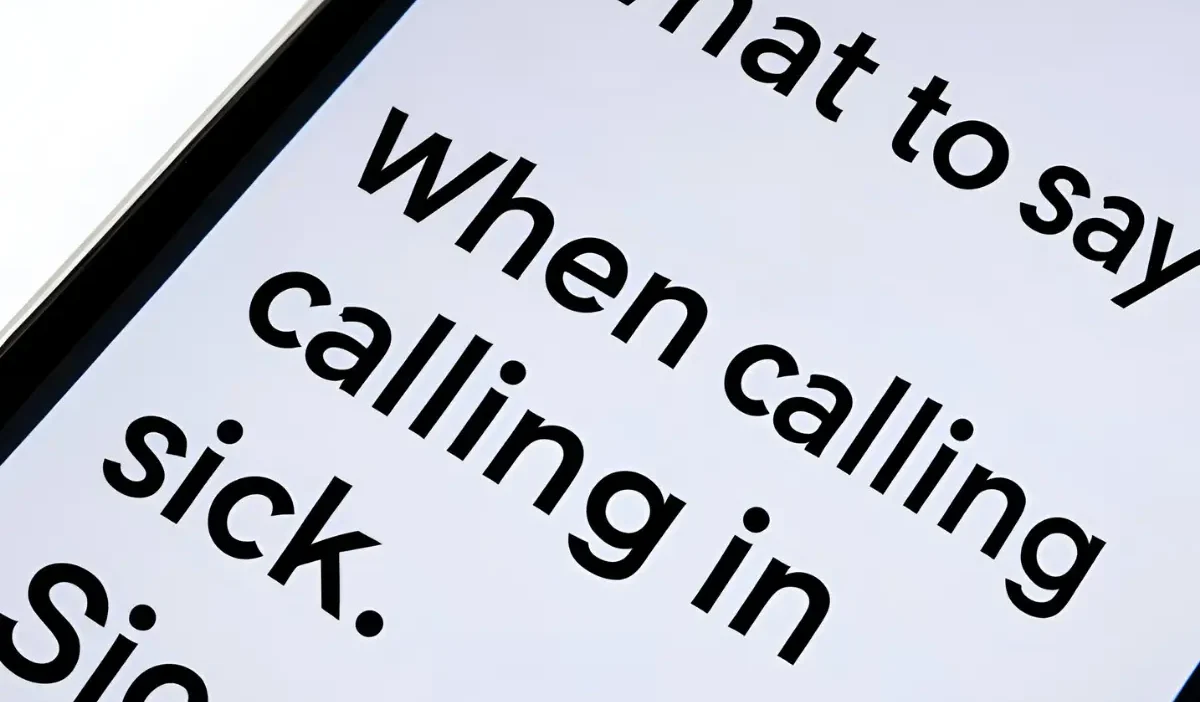Feeling under the weather and dreading the moment you need to tell your boss?
You’re not alone! Sending a text to call in sick can feel awkward, especially if you’re worried about sounding unprofessional or unsure about what to say when calling in sick text.
Whether it’s a sore throat, a fever, or just needing a mental health day, crafting the right message is key to keeping things smooth with your employer.
In this guide, we’ll walk you through how to text your boss when you’re sick, offering practical tips, examples, and ways to stay professional while being honest.
By the end, you’ll feel confident about hitting “send” without stress.
Let’s dive into how to handle this tricky situation with ease and clarity, so you can focus on resting and recovering.
Why Texting to Call in Sick Feels So Hard

Texting your boss about being sick can feel like walking a tightrope. You want to be honest but not overshare, professional yet human. The fear of sounding lazy or unreliable often makes people overthink their message. A good sick text is short, clear, and respectful, but it’s easy to get stuck wondering if you’ve said too much or too little.
Scenario: Imagine you wake up with a bad cold and can’t make it to your retail job. You’re worried your manager might think you’re just avoiding a busy shift.
Example of what to say: “Hi [Boss’s Name], I’m unwell with a cold today and won’t be able to come to work. I’ll keep you updated on my recovery.”
What not to say: “Hey, I’m dying with a cold, probably won’t make it, sorry!” This sounds too casual and dramatic, which can come off as unprofessional.
Keep it simple, mention your illness briefly, and reassure your boss you’ll follow up. This sets the right tone and shows responsibility.
How to Keep Your Sick Text Professional
A professional tone is crucial when texting about a sick day. You don’t need fancy words, but you do need to show respect for your workplace. A professional sick text includes your reason for absence, when you expect to return, and an offer to handle any urgent tasks remotely if possible. This shows you’re still committed to your job, even while unwell.
Scenario: You’re a teacher with a stomach bug and need to miss a day of classes. You want to ensure your absence doesn’t disrupt lesson plans.
Example of what to say: “Good morning [Boss’s Name], I’m down with a stomach bug and won’t be able to teach today. I’ve shared lesson plans with [Colleague’s Name]. I should be back tomorrow.”
What not to say: “Yo, I’m sick, can’t come in today, good luck!” This lacks detail and sounds dismissive.
Always include a timeline for your return and mention any steps you’ve taken to cover your work. This builds trust and keeps things running smoothly.
Timing Your Sick Text: When to Send It
Timing matters when texting about a sick day. Sending your message too late can make you seem disorganized, while texting too early (like 2 a.m.) might catch your boss off guard. The best time to send a sick text is as soon as you know you can’t work, ideally before your shift starts or during early morning hours.
Scenario: You’re a nurse who wakes up with a fever at 6 a.m. Your shift starts at 8 a.m., so you need to notify your supervisor quickly.
Example of what to say: “Hi [Boss’s Name], I woke up with a fever and won’t be able to work my shift today. I’ll update you on my status tomorrow.”
What not to say: Sending nothing until noon or later, like, “Sorry, I’ve been sick all morning, can’t come in.” This leaves your team in a lurch.
Aim to send your text at least an hour before your shift or as soon as the workday begins. This gives your boss time to adjust schedules.
What to Include (and Skip) in Your Sick Text
Knowing what to say when calling in sick text means balancing enough detail with brevity. Include your reason for being absent, how long you expect to be out, and any plans to cover your work. Avoid oversharing personal details or vague excuses that might raise doubts about your honesty.
Scenario: You’re an office worker with a migraine and need a day to recover. You don’t want to share too much medical info.
Example of what to say: “Hi [Boss’s Name], I’m dealing with a migraine today and need to take a sick day. I’ll ensure all my reports are sent tomorrow.”
What not to say: “I’ve got this killer headache, been throwing up, and my head’s pounding, so I’m out.” This is too detailed and unnecessary.
Stick to the basics: state your illness, mention your expected return, and avoid graphic details. This keeps your message clear and professional.
Handling Follow-Up After Your Sick Text
After sending your sick text, you might need to follow up, especially if you’re out for more than a day. Following up shows you’re responsible and keeps your boss informed. Let them know how you’re feeling and when you plan to return, or if you need more time.
Scenario: You’re a barista who texted about a sore throat yesterday. Today, you’re still not better and need another day off.
Example of what to say: “Hi [Boss’s Name], I’m still recovering from my sore throat and need one more day. I’ll confirm my return tomorrow morning.”
What not to say: “Still sick, not coming in.” This is too vague and doesn’t show you’re managing the situation.
Check in daily if your absence extends, and be clear about your recovery timeline. This keeps communication open and shows you’re on top of things.
Adjusting Your Text for Different Workplaces
Every workplace has its own vibe, so tailor your sick text to fit your company’s culture. A formal office might expect a polished message, while a casual startup might be fine with something relaxed. Customizing your sick text ensures it feels appropriate and gets the right response.
Scenario: You’re a graphic designer at a laid-back agency but still want to sound professional.
Example of what to say: “Hey [Boss’s Name], I’m under the weather with a fever today and can’t make it in. I’ll finish the logo designs tomorrow.”
What not to say: “I’m sick, brb in a couple days.” This is too informal for most settings.
Think about your workplace’s tone and match it while keeping the essentials: reason, timeline, and responsibility. This makes your message feel natural.
Conclusion
Crafting the perfect what to say when calling in sick text doesn’t have to be stressful.
By keeping your message short, professional, and timely, you can communicate your absence with confidence.
Focus on the essentials: state your illness, mention when you’ll likely return, and offer to handle any urgent tasks.
Tailor your tone to your workplace, avoid oversharing, and follow up if needed.
With these tips, you’ll maintain a good relationship with your boss while prioritizing your health.
Next time you’re feeling unwell, use these examples to send a text that’s clear, respectful, and stress-free. Rest up and feel better soon!




